In January 2023, the Biden-Harris Administration released a blueprint for the proposed Renters Bill of Rights. Their statement was a collection of principles but wasn’t legally binding. Despite this caveat, many landlords worried about the document and its potential impact on their rental business.
The TurboTeam conducts regular survey assessments to evaluate the state of the rental industry. In a recent questionnaire, we asked over 1,800 landlords and renters how they felt about the Renters Bill of Rights. Let’s examine the general sentiment toward the proposal, where landlords and renters differ, and how this might impact your landlord-tenant relationship down the line.
Streamline Your Rental Property Management

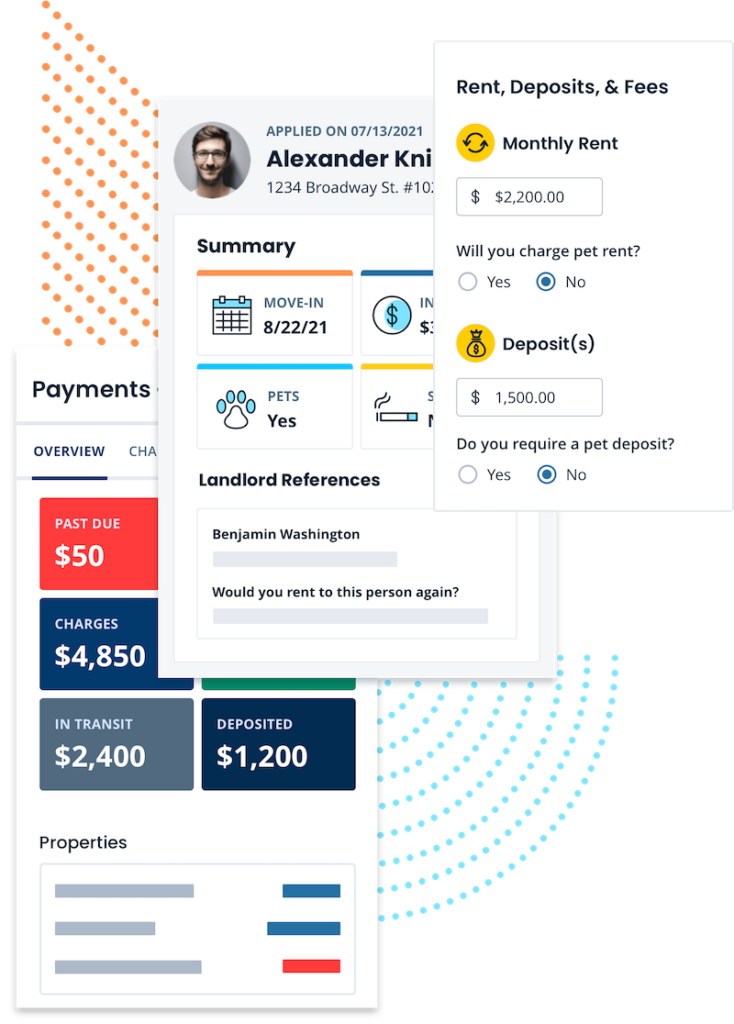
A Brief Summary of the Renters Bill of Rights
The video above walks through everything landlords should know about the Renters Bill of Rights in mid-2023. We’ll summarize the five key principles below as we explore how everyday landlords and tenants feel about this proposal.
First, it’s critical to know the context of the question.
As part of TurboTenant’s latest State of the Rental Industry report, we asked landlords and tenants the following:
How do you feel about the Renters Bill of Rights proposal?
- I don’t care about it
- I don’t know enough about it
- I oppose it
- I support it
Those who selected “I don’t know enough about it” saw this question next:
The Renters Bill of Rights is a set of five principles proposed by the White House that would serve as protections for renters across the country.
The five principles are:
- Access to safe, quality, accessible, and affordable housing
- Clear and fair leases
- Education, enforcement, and enhancement of rights
- The right to organize
- Eviction prevention, diversion, and relief
How do you feel about the Renters Bill of Rights as presented above?
- I support it
- I don’t care about it
- I oppose it
- Other – write in
Landlords React to the Renters Bill of Rights
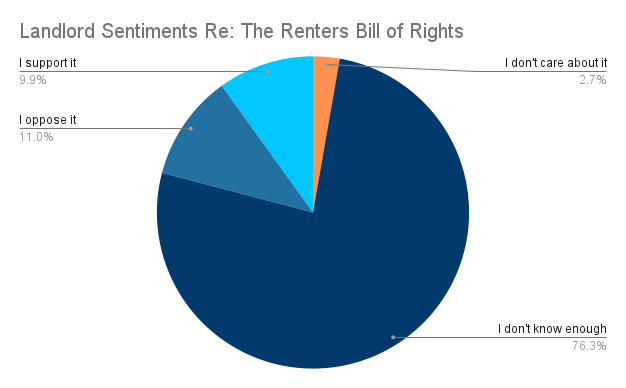
When presented the original question, over 75% of landlords indicated they didn’t know enough about the Renters Bill of Rights to feel strongly in any direction. 11% of respondents said they oppose it; 9.9% support the proposal, nearly tied with its opponents. Only 2.7% of landlords didn’t care about the subject.
The landlords who weren’t familiar enough with the Renters Bill of Rights were presented the second question, then asked their opinion again.
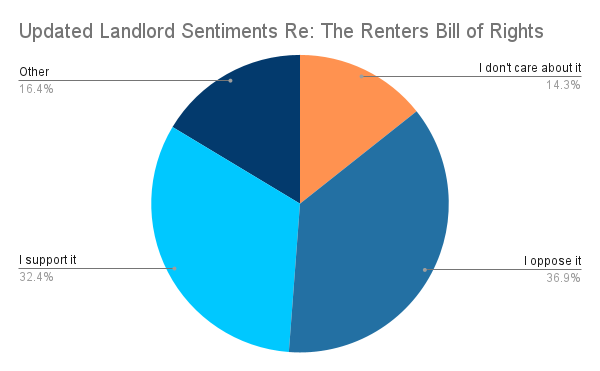
After reading a brief summary of the Renters Bill of Rights:
- 36.9% of landlords opposed the proposal
- 32.4% supported the proposal
- 14.3% didn’t care about the subject
- 16.4% wrote in other responses, which included:
- Critiques of the current White House Administration
- Nuanced takes on the proposal based on personal experience
- Complaints that the summary was too brief to offer enough information
In other words, the majority of landlords disagree with the proposed Renters Bill of Rights. But there are definite supporters of the protections, too. Now let’s flip the coin and review the renters’ perspectives.
Renters React to the Renters Bill of Rights
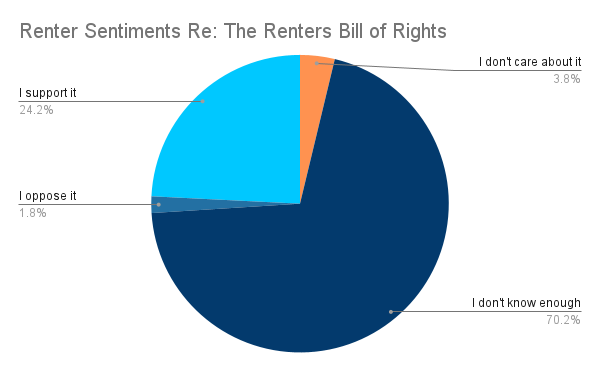
Surprisingly, the majority of tenants didn’t know enough about the Renters Bill of Rights proposal to have a strong opinion – in nearly the same proportion as their landlords. Notably, renters supported the proposal from the first question nearly three times more than landlords. Less than 5% of renters didn’t care about the subject, and only 1.8% opposed it outright.
The 70.2% of respondents who didn’t know enough about the Renters Bill of Rights were provided the same follow-up question as their landlord counterparts.
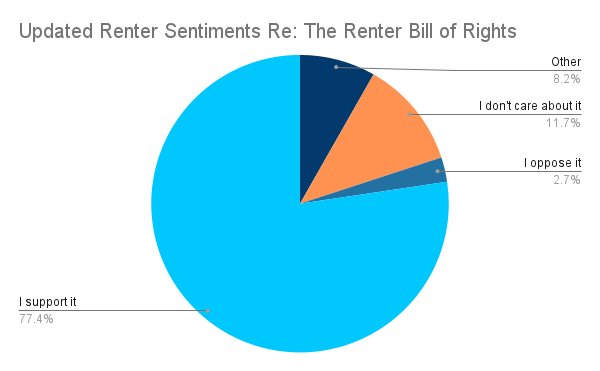
After reading a brief summary of the Renters Bill of Rights:
- 77.4% of renters supported the proposal
- 2.7% opposed it
- 11.7% didn’t care about the subject
- 8.2% wrote in other responses, which included:
- Critiques of the current White House Administration
- Gratitude for those providing safe, affordable housing and wanting to protect them from bad tenants
Where Do Landlords and Tenants Differ on the Renters Bill of Rights?
Clearly, landlords and tenants view the proposed Renters Bill of Rights from different perspectives. Landlords overwhelmingly oppose the proposal; tenants flock en masse to support it. But given that both groups needed more information to form their opinion on the subject, it’s clear that this topic should be discussed widely.
Hearing about “renters rights” scares many landlords; they view it as a threat to their business or an unwelcome intrusion from the government. However, the five principles presented in the White House’s original statement shouldn’t negatively impact law-abiding landlords.
For example, let’s look at the first principle: access to safe, quality, accessible, and affordable housing. Under URLTA (the Uniform Residential Landlord-Tenant Act) and the ADA (Americans With Disabilities Act), landlords are legally bound to provide safe, quality, and accessible housing. The affordability aspect is nuanced; the continued housing shortage and plundering from institutional investors don’t help. But by and large, the proposals at the heart of the Renters Bill of Rights shouldn’t scare landlords – nor will it enable tenants to mistreat their investment properties.
However you feel about the Renters Bill of Rights, it’s critical to stay informed on its progression. After all, it may impact your relationship with your tenant.
Potential Effects of the Renters Bill of Rights on Your Landlord-Tenant Relationship
Whenever landlord-tenant legislation is in the news, there’s a propensity to fall back into divided camps – landlords on one side, renters on the other (despite the fact that the majority of both groups didn’t know enough about the Renters Bill of Rights to form an opinion initially).
Don’t fall for it.
You’re not fighting against your tenant; you’re working with them. Remember to pause when you hear “renter protections” so you don’t hear “another burden on my rental business.” Even if you’re running the best, most compliant rental management business, there are bad actors who take advantage of tenants every day. Landlords can screen tenants, see their backgrounds, and decide whether or not to work with them. Tenants have no such luxury.
So, when in doubt about new legislation, remember to do your research. That might mean searching for the law on your own – or you could subscribe to TurboTenant’s YouTube channel and weekly newsletter so you can stay informed on the research we already do for you. If you’d like to learn more about the state of the rental industry in 2023, read our original research regarding portfolio size, raising rent, and who’s buying more property before the year ends.







